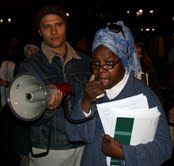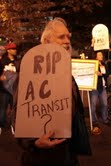
AC Transit riders rallied against service cuts in downtown Oakland on Nov. 9 as agency officials announced an agreement in an ongoing labor dispute with bus drivers.
The decision halted planned December service cuts, that would have brought service to its lowest levels in 30 years, but there will likely be future service reductions.
In the past year, the agency has hiked fares and slashed service twice, as the agency was “hemorrhaging” towards fiscal insolvency. Meanwhile, bus riders have been paying more money for less transit service.
Riders, who launched a “Stop the Cuts” campaign, held “Rest in Peace” gravestones with the names of former bus lines and routes that were to be cut next month. Some signed a testimonial board, sharing that they would no longer be able to get to school, work, the grocery store, or to other services if there were more cuts.
Nearly 150 riders and supporters attended the rally, which grew as time progressed. Many said they arrived later due to crowded or late buses. Riders and allies called on elected officials to fight for AC Transit riders with the same tenacity that many fought for BART’s Oakland Airport Connector (OAC) project. The $500 million rail extension will primarily serve wealthy and white suburban commuters, advocates said, and follows a historical trend discriminatory transit funding in the Bay Area.
Riders and allies called on elected officials to fight for AC Transit riders with the same tenacity that many fought for BART’s Oakland Airport Connector (OAC) project. The $500 million rail extension will primarily serve wealthy and white suburban commuters, advocates said, and follows a historical trend discriminatory transit funding in the Bay Area.
Elected officials from throughout Oakland, Alameda County up to California’s congressional delegation collaborated to find money when BART lost $70 million worth of federal stimulus money for failure to comply with civil rights rules. Over 15 elected officials attended last month’s ceremonial groundbreaking for the OAC at the Oakland Coliseum.
“Now AC Transit is short $56 million and is cutting core service to thousands of riders, and no one seems to be paying any attention,” said Jana Lane, a bus rider and member of Genesis, a faith based advocacy group.
At the bus riders rally, two elected officials, and two staffers of other electeds, were present.
“People need to get to school, people need to get to work, to the grocery store, to the doctor,” Richmond Mayor Gayle MacLaughlin said. Discussing some of the city’s efforts of smart redevelopment, she asked, “What good is it to have Transit Oriented Deveopment if you don’t have the transit?”
Alameda County Supervisor Nate Miley, also president of United Seniors of Oakland and Alameda County, encouraged people to keep up the fight.
“We’ve been in the struggle for better, accessible transit service since 1982,” said Miley. The most vulnerable populations–seniors, youth, disabled and low-income– are hurt most by service cuts., Miley said. With the recent passage of Measure F, a vehicle registration fee at the county level, more funds will come to AC Transit soon, he said. However, Miley said advocates must also focus on the upcoming reauthorization of Measure B, a county sales tax measure.
Both Miley and MacLaughlin signed the pledge at the rally. Supervisor Keith Carson and Assembly Member Nancy Skinner were unable to attend, but had staff representatives present, and have signed the pledge.
The OAC’s top supporters were Oakland Mayor Dellums, Council President Larry Reid, and County Supervisor and chair of the Metropolitan Transportation Commission (MTC) Scott Haggerty, according to advocates.
These elected officials stepped in to find funds and swap monies at the federal, state and local level, and battled Obama’s Federal Transit Administration (FTA).
After the rally finished, Thia Artemis, arrived on a 26 line bus from West Oakland. She needs both a wheelchair and service dog, and often has to wait longer for less frequent buses because of crowding. “It’s much harder now to get around,” Artemis said of the October service reduction. And with cuts to Paratransit service also, she has difficulty getting around, “Are we supposed to just not go anywhere?”
“It’s much harder now to get around,” Artemis said of the October service reduction. And with cuts to Paratransit service also, she has difficulty getting around, “Are we supposed to just not go anywhere?”
After labor negotiations broke down between AC Transit and the Amalgamated Transit Union (ATU) Local 192, the union representing the district’s 1,750 bus drivers, the Board of Directors voted to impose a contract.
That contract; however, was challenged by the union in court. A judge ordered the district return to the previous contract, and sent both parties to binding interest arbitration.
The three-year contract agreement has averted December’s proposed cuts, and calls for drivers to contribute a percentage of their health and benefit plans, work rule and holiday, according to an AC Transit press release.
The December cuts would have slashed nearly half of all weekend service completely and the majority of its All-Nighter (Owl) service.
Despite the seemingly good news, AC Transit is at its lowest service levels in years., and will likely have more cuts in the future. AC Transit completely reconfigured its routes with a 7.5 percent service reduction March, followed by another 7.5 percent cut that took place Oct. 31.
The agency has declared a fiscal emergency two years in a row, after projected deficits of $56 million. Additionally, 50 drivers were laid off in October and the AC Transit recently outsourced its in-house customer service center to Iowa, resulting in nearly a dozen long-time employees being laid off or forced to retire.
“We are not out of the woods yet when it comes to having sustainable long-term financial stability,” Interim General Manager Mary King said. “In all probability cuts will still have to be made sometime in 2011.”
Although the majority of seats were up on the AC Transit Board, all but one incumbent–who did not run for office–was elected.
AC Transit cancels December cuts, bus riders rally for service
Monday, November 15, 2010
The Black Hour


